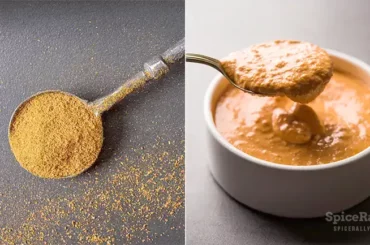Vinegar is undoubtedly something that adds extra flavor to make your food taste more appealing. In fact, the subject leaders of this article are two of the most common types of vinegar that most of us have at home. Accordingly, we will share everything you need to know about apple cider vinegar vs rice vinegar.
The key difference between apple cider vinegar and rice vinegar comes down to their main ingredient. In essence, apple cider vinegar is made by fermenting apple juice, while rice vinegar is obtained from fermenting glutinous rice. Consequently, they have different flavors, colors, and acid levels.
So, we invite you to scroll down to learn more facts about the difference between these two popular kinds of vinegar.
Apple Cider Vinegar vs Rice Vinegar
| Apple Cider Vinegar | Rice Vinegar | |
|---|---|---|
| Core ingredients | Apple juice/ apples | Glutinous rice |
| Other Ingredients | Water Sugar Yeast | Water Vinegar culture |
| Types and variations | – Raw apple cider vinegar – Filtered apple cider vinegar – Apple cider vinegar with “The Mother” – Organic apple cider vinegar | – White rice vinegar – Black rice vinegar – Brown rice vinegar – Seasoned rice vinegar – Red rice vinegar |
| Flavor profile | More potent and fruitier than rice vinegar with sour and assertive flavor notes. | Sweeter than apple cider vinegar with sour, mild, and mellow touches |
| Color | Cloudy, brownish, or amber in color and darker than rice vinegar. | The most commonly used white rice vinegar is pale yellow or colorless. Other types can range from brown to red. |
| Key Usages | – Mainly used in cooking to flavor salad dressings, marinades, soups, glazes, pickles, etc.) – Can be used in baking and to make desserts (caramelized pies, apple butter, etc.) – Beneficial in household use (to clean windows, as a fruit fly trap, a mold killer, dish/ bathroom/ wood floor cleaner) – Helps skin and hair care (works as a hair rinse, controls dandruff, functions as a facial toner, a spot treatment, etc.) | – Typically used in cooking (in sushi, salad dressings, to season vegetables and rice, in pickles, as a seasonal shrub cocktail) – Used for household cleaning purposes. – It may also act as a natural facial toner |
| Mode of production | Homemade and commercially made versions exist. | Typically made commercially but homemade recipes also exist. |
| Availability | – Comes to the market in bottles – Can be purchased from supermarkets, most grocery stores, and online sellers. | – Comes in bottles. – Ready available in Asian grocery stores, supermarkets, and online shopping sites. |
| Type of acid | Acetic acid | Acetic acid |
| Level of acidity | 5% – 6% | 4% |
| Health benefits | – Aids with weight loss – Helps to lower blood sugar – Contains antibacterial properties – Soothes sore throat – Promotes dental care functioning as a mouthwash | – Helps to maintain healthy blood sugar levels – Lowers bad cholesterol – Reduces appetite and helps with weight loss – Boosts immunity – Improves heart health |
| Nutritional Value | – Apple cider contains powerful vitamins, minerals, and probiotics. – Raw, organic, and unfiltered apple cider vinegar is rich in nutrition and can offer many health benefits. | – It contains phenolic compounds and is rich in antioxidants. – Rice vinegar has no sodium or calories. Therefore, it is comparatively as healthy as apple cider vinegar. |
What Is Rice Vinegar In A Nutshell?
Rice vinegar is a substance that is prevalent in Asian cuisine and is reputed for its amazing ability to add tons of flavor to sushi. And as the name suggests, it is obtained through a process of fermenting and aging glutinous rice.
There are many variations of rice vinegar, but white rice vinegar is the most commonly used one in Western cuisine. This is actually considered one of the mildest types of vinegar when compared with the others. In fact, it has a sweeter and more delicate flavor profile with comparatively low acidity.
What Is Apple Cider Vinegar?
Apple cider vinegar is produced by fermenting apple juice. And this substance actually has a history of thousands of years.
Interestingly, this vinegar has recently gained the attention of many people for its incredible health benefits. Moreover, thanks to its robust fruity touch, apple cider vinegar has the ability to add flavor to many savory dishes as well as some sweet dishes.
Summing Up Apple Cider Vinegar vs Rice Vinegar
As you see, these two types of vinegar have some significant differences starting from their core ingredients, flavor, and color. But despite those differences, they can be used interchangeably in many instances like marinades, salad dressings, etc.




